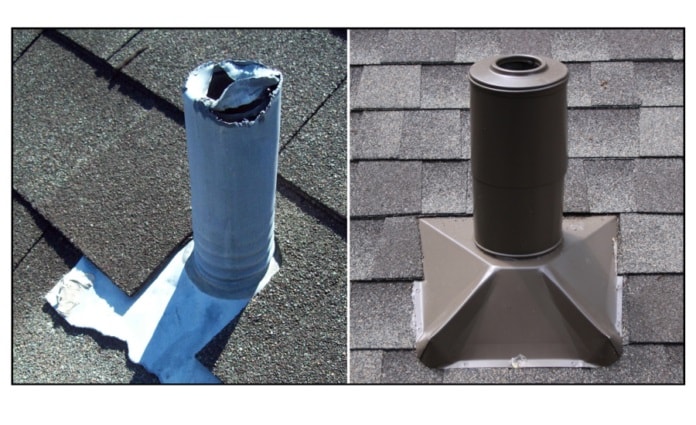It looks like the amount of exhaust is up to code for 1500 sf attic space.
Snow blowing into attic through roof vents.
Snow coming through roof vents.
I can tell you that when the snow is dry and light and the wind is high it will blow in through most if not all roof vents that i know of.
Attic snow can accumulate when the wind conditions are just right and you have ridge vents.
Later it would get warm melt and end up as a leak.
Roofers often complain that roof vents battered by storms can fail allowing blowing snow and rain to penetrate the attic.
Some time after the house was first built it is about 35 years old the previous owner had some problems with leaks in the house due to snow infiltration through vents in the soffits.
Ventilation is code btw so lose that roofer if you re really a gc.
1500 300 5 times 144 720 2 360sq inches of exhaust and at least the same amount of intake.
Static vents often protrude from roofline thanks to special covers intended to keep all precipitation rain sleet hail and snow from entering the attic.
It would just pile up in the attic.
Invented by a roofer to defeat the harsh canadian winters this csa approved static box vent has been independently tested to block 99 99 of snow and rain even in severe storm conditions.
During a rain storm winds may blow rain into your home through the attic vents.
If you see new water spots on your ceiling after a windy snowfall you might have this problem.
This snow usually evaporates my overkill was to put large aluminum tinfoil oven pans under each of my roof vents to catch and hold the snow that will form a small hill under each vents with the right conditions.
Minimizing water intrusion through roof vents in high wind regions 2 of 8 r 7 oofing 12 10 mitigation guidance soffit vents key issues n it is important to keep the soffit ma terial in place.
Obviously snow is no good in the attic as it will eventually melt causing damage and possibly mold over time.

